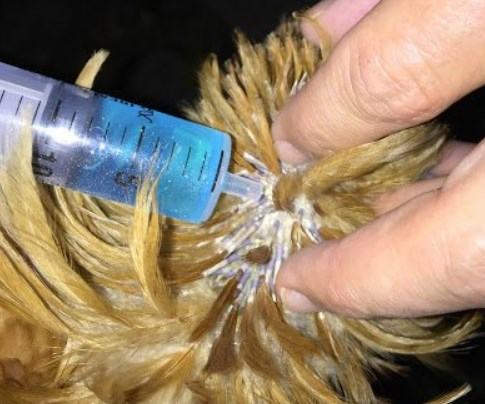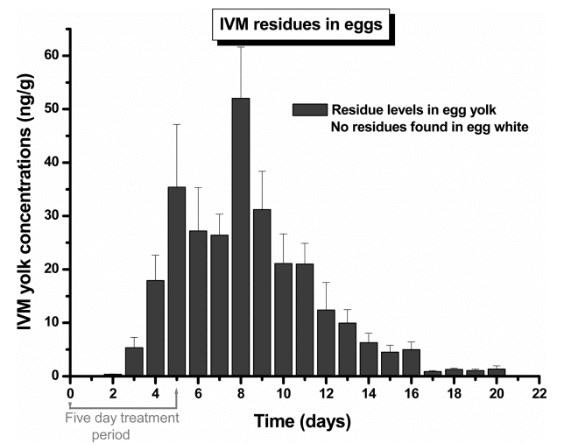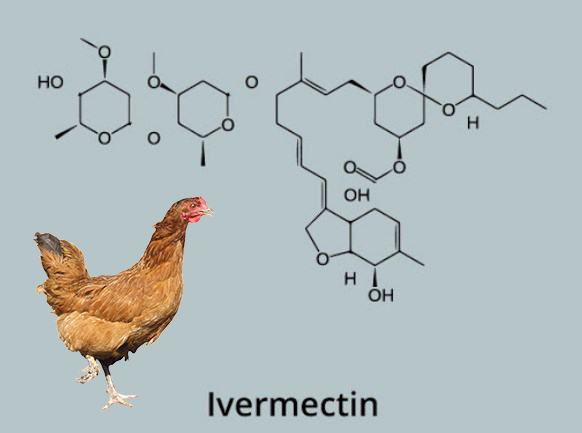No products in the cart.
Chicken
Ivermectin For Chickens – All You Need To Know!
Ivermectin (IVM) is one of the most beneficial and safe antiparasitic drugs used to prevent, control, and treat various parasites in the animal. If you intend to use Ivermectin for chickens, then read through this article for more detailed information on how much to give, how long it takes to work, the egg withdrawal period, and so on.
*This post may have affiliate links, which means I may receive commissions if you choose to purchase through links I provide (at no extra cost to you). As an Amazon Associate I earn from qualifying purchases. Please read my disclaimer for additional details.
What is Ivermectin for chickens?
IVM is a medication used to treat internal and external parasite infestations in humans and animals with great success and limited side effects. This drug kills most species of adult roundworms in poultry and is also given as a treatment for scaly leg mites, intestinal parasites, and lice.
IVM was an absolute revolution in parasite control. For the past 30 plus years, it has been used to treat livestock, such as sheep and cattle to protect them from awful parasites.
How does Ivermectin work?
Nerve cells have glutamate ion channels which are important in cellular signaling. These channels open and close continuously to start a signaling pathway within the cell.
Ivermectin binds to receptors of these channels and keeps them open all the time. From there, the drug allows ions to enter and create an ion imbalance. After that, the cell signals wrongly and generally lead to paralysis.
How to give Ivermectin to chickens?
There are many different brands and derivatives of Ivermectin. Some products are absorbed by ingestion through the flocks’ water supply and others are placed on the skin intravenously, orally, topically. The easiest method trusted by a lot of chicken owners is to use it externally via drops on the back of the hen’s neck.

If IVM is applied topically on the skin, the dosage would be 200 micrograms (=.04ml)/kilo. One drop from a standard eyedropper = .05ml; hence if your chicken weighs 2 kilos, the dosage would be less than 2 drops.
With proper doses, IVM is a safe and effective medication. On the other hand, with higher doses of IVM, egg production and feed, as well as water consumption, are noticeably reduced.
Additionally, overdosing on your chickens can create a mass die-off of worms. Chickens normally live in harmony with internal parasites, so it only becomes problematic if chickens have a heavy infestation.
How long does Ivermectin take to work on chickens?
Ivermectin can take about 2 or 3 days to completely kill the parasites present on a chicken’s body.
Remember to repeat with a second treatment in 7-10 days to ensure you have killed any larvae that have hatched subsequently to the first one. For the best result, you should treat them about every 3-4 weeks to keep them clean.
Read More: What to Do for a Duck with a Broken Leg. If your duck is hurt, here’s a brief guide on first steps to help it recover!
Can you eat eggs after Ivermectin?

The graph above describes Ivermectin residues after oral administration. After 5 days, although IVM residues were not found in egg white, significant residues were quantified in the yolk.
When injected (400ug/kg), it took 2 days for the concentration of the drug to be halved within the body. This same dose was presented in drinking water over a period of 5 days. After 8 days, the level of IVM is about 50ng/gm of egg yolk.
As advised by many vets, the egg withdrawal period should be 8 days because residue ending in the egg yolk then will clear when it applies to water.
It is recommended that eggs treated with Ivermectin should not be consumed by humans after a period of 14 days. From then on, the level of the drug in chickens is considered negligible and eggs from the poultry can be now consumed.
Read More: Why Do Hens Lay Unfertilized Eggs? Here’s why hens lay unfertilized eggs and how you can spot the difference!
How long after Ivermectin can you eat the chickens?
After Ivermectin treatment, be sure to follow the meat withdrawal timeframes. As advised by the Vet, slaughtering chickens for human consumption is 28 days after the IVM treatment.
Final Words
Ivermectin was a truly revolutionary drug in control of uninvited visitors because of its good safety profile as well as low adverse effects. I hope the article provided adequate information about Ivermectin for chickens and other related questions. So, why don’t you take action immediately to guarantee the safety of this animal food product for our consumption?

